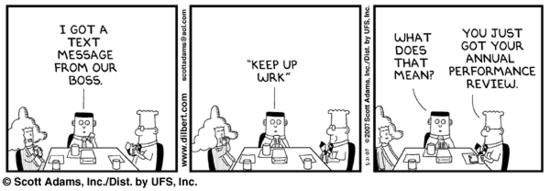As we scream into the end of 2016, companies scramble for that big end-of-year event. No, not the company holiday party. We’re talking about annual review time.

(Source: acendre.com)
If you are human (and we’re guessing you are) there is a good chance your annual review will not be all smiley faces and gold stars.
Another way to put it, if your review has any value, it will come with some tough feedback. You want that. What is less likely, however, is that your tough feedback will land well.
While many companies like churn out reviews, what they fail to do is prepare their leadership to conduct those reviews. That’s not your fault.
Despite this, it is not to your benefit to point out this gap in human resources, wearing a stink-face through your review.
Take control of the situation. Strap on a genuine expression of gratitude, be it a smile or otherwise. Do it because you understand how feedback makes you better.
Own every bit of tough feedback as if you refinanced those behaviors. Plan to partner with your supervisor to make the most of the review process.
Moreover, plan to adapt as best you can.
Feedback Makes You Better

(Source: oktopost.com)
The tougher the feedback, the better. This sounds great in theory until your feedback doesn’t match your confirmation biases.
Perhaps you see yourself as organized. Maybe because you surround yourself with people less organized than yourself, but your supervisor holds you to a higher expectation. Then, imagine this feedback delivered without a grain of sugar.
The prospect of tough feedback in this context feels more like tolerance of abuse.
You won’t get anywhere in your career, writing off tough feedback as verbal abuse. (If you’re being abused, don’t complain, call a lawyer.) If you victimize yourself during your review, then that’s where you will remain.
Instead, try to hear what you can own of the feedback. If anything, listen with a “you may be right about that” attitude, planning to later absorb it as you can later. You can find a way to agree with a perspective that isn’t yours.
To put it in other terms, the moment you argue against feedback is the moment you teach someone that you’re not interested. It’s the beginning of the end of an honest relationship.
Ownership Earns You Respect

(Source: giphy.com)
Taking ownership means pain. There is no ownership without backlash. Many people will raise their hands when things are bad and claim fault, but fewer people are willing to accept the consequences of taking fault.
This may mean you get less of a bonus. It may mean they pass over you for promotions this year. What’s your alternative?
Even if you could argue your way out of responsibility, what you teach those in charge is that as your sphere of responsibility increases you will not adapt to the stress.
People are not perfect. You’re a person. Ergo, you are not perfect. Nobody reasonable expects perfection. You get to make mistakes. You can come back from poor performance.
As long as your errors do not compromise the values or earnings of the company, you can likely survive course corrections.
Partnership Improves Your Feedback

(Source: footage.framepool.com)
Your boss has more than one direct report. Depending on how horizontal your company’s org chart is, that could be as many as twenty people under your boss.
Expect your supervisor, even in the best leadership companies, to suffer distractions. Rather than waiting for her to come to you, don’t leave any feedback meeting without a follow-up meeting.
Take notes, make plans for specific behavioral adjustments, then plan to execute. Agree with your supervisor that she will observe your actions and that you will make improvements. Partner with her on your progress.
Keep in mind your supervisor may change. You want to be ready to meet with your next supervisor as soon as that person settles into her new role.
Change Demonstrates Your Value

(Source: crbprogram.org)
Like taking ownership, planning to change versus actually changing is one of those things that sounds much easier than it is. Change is hard.
We are creatures of habit, wired 50% by our habits. Making different moves in your work environment will take a level of consciousness in a place where you tend to run on autopilot.
It’s only when you gain a clear understanding of what needs to change, along with actionable behaviors you can and are willing to execute, that you’ll change.
It’s no guarantee, but without clarity, without steps, you’ll have no chance. Make it your responsibility to get that clarity, to get those steps, not your boss’s.
These will be the talking points for your follow up meetings.

(Source: romper.com)
When you run these plays, you set yourself up for a better review process. Your subsequent reviews will have more value. You will avoid the sideswipe of feedback that often comes with these meetings.
Your boss, too, will appreciate your review more than those of your less active partners.
If you’ve allowed yourself to accept some tough blows one year, you’ll be better aligned to grab opportunities the following year.



